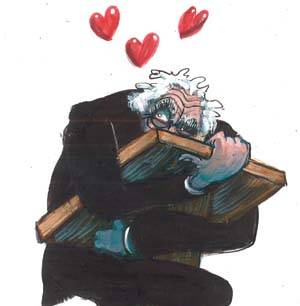
This article is a preview from the Summer 2015 edition of New Humanist. You can find out more and subscribe here.
What is Humanism? How do you Live without a God? And Other Big Questions for Kids (Wayland) by Michael Rosen and Annemarie Young
“What is Humanism?” is a question that is singularly capable of sending humanists into a tail-chasing spin. Are we a collective at all? Can we be defined when our values are – by definition – individually constructed and chosen? Even worse, we are deeply suspicious of the spectre of atheistic evangelism and terrified to the core of telling children what to think. So perhaps a fitting way to begin a review of a book with this fraught question as its title, which aims to define humanism simply and comprehensively and is destined for school audiences around the country, would be to applaud Michael Rosen and Annemarie Young for their bravery. It can’t have been an easy task.
The context for the book is genuinely groundbreaking. It is the first of its kind, aimed at the new curriculum framework for RE in England, which has placed non-religious worldviews such as humanism on an equal footing with the six main religions. This is humanism’s moment in the spotlight to explain itself to the nation’s upper primary school and lower secondary schoolchildren. It is important and exciting that this book exists.
In it, the authors explore some of the biggest questions that face adults and children alike. How did the earth begin? What is the purpose of life? Can you be good without gods or religion? There is a potted history of humanist thought, examples of humanist ceremonies to mark birth, marriage and death and the personal philosophies of well-known humanists including Philip Pullman, Jim Al-Khalili and Natalie Haynes. This is no simple creed or set of rules, but a patchwork of personal experience, thought-provoking questions, quotes (from Daniel Radcliffe and Einstein to Shakespeare and Marie Curie) and thoughts on tolerance, reason and choice. Students are invited to ponder the issues and then write a “charter” for themselves – a set of values for how they want to live their lives.
The contrast to an equivalent textbook about religion, with its emphasis on sacred texts and truths, is both instructive and appealing. That abiding humanist fear of finding ourselves unwittingly in the role of indoctrinators is faced very directly. “This book is not going to tell you what to think, or try to persuade you to become a humanist,” it begins. “Our aim is to get you to think for yourself about the big questions.” In that ambitious aim, it may well have succeeded. Questions are as prominent as possible answers. Stephen Fry ends his contribution with “Don’t take my word for it either. Don’t take anybody’s word for it. Find out for yourselves. Happy living!”
The mixed-bag approach is probably a wise one, not only in reflecting the ideas of an eclectic and divergent non-group of people but also in providing “something for everyone” in terms of interest. Connections are drawn as well as distinctions – for example in discussing the “Golden Rule” with illustrative quotes from Islam, Buddhism, Christianity and Hinduism. I get a warm and fuzzy feeling when I think of my own 9-to-14-year-old self, teetering uncertainly on the brink of sceptical thought, being given a book like this to read. It is bursting with common sense and warmth, like the quote from the inimitable Camila Batmanghelidjh, who proclaims that “Creating your own good rules to live by is like making a delicious cake and getting to eat it”.
Some humanists may struggle with the inevitable generalisations that pepper the text. Statements such as “Most humanists think that there should be religious toleration” and “most humanists believe that no human being is less or more worthy of life than any other” or “some humanists oppose all wars” are not unproblematic, given that “most” humanists may not even identify themselves as humanist at all. But this book isn’t written for us. It isn’t a manifesto. There are many styles and colours of godlessness out there – this book represents an idealistic and optimistic strand. But if you wanted to send some ambassadors into schools to talk both sensitively and inspiringly about humanism to a diverse mix of school children, you couldn’t do much better than enlist Michael Rosen, Annemarie Young and their chosen tribe of famous, clever and funny helpers to do the job.

